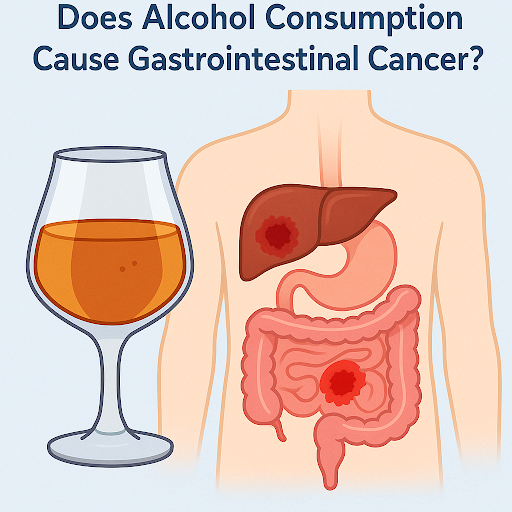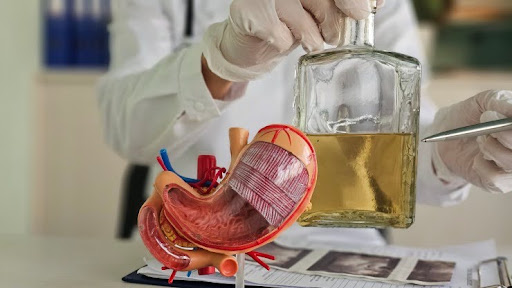

Does Alcohol Consumption Cause Gastrointestinal Cancer?
When we think about cancer, smoking is often the first risk factor that comes to mind. But many people don’t realize that alcohol can also be a significant cause of cancer, especially cancers related to the digestive system. Over time, regular or excessive alcohol intake can increase the risk of gastrointestinal (GI) cancers, which include cancers of the esophagus, stomach, liver, pancreas, colon, and rectum.
If you’re a regular drinker and have started experiencing digestive problems or general weakness, it’s important to seek medical advice. Dr. K. V. Dinesh Reddy, one of the best surgical gastroenterologists in Hyderabad, has over 14 years of experience in managing GI cancers using advanced diagnostic and surgical techniques.
How Does Alcohol Increase the Risk of GI Cancer?
When alcohol enters your body, it does more than just affect your liver — it can cause widespread changes that lead to cancer:
- Cellular Damage: Alcohol irritates and inflames the lining of your digestive tract. This repeated damage can lead to cell mutations and, eventually, cancer.
- Acetaldehyde Buildup: Alcohol breaks down into a toxic chemical called acetaldehyde, which damages DNA and prevents cells from repairing themselves.
- Liver Stress: Excessive drinking causes liver inflammation and scarring, which over time increases the risk of liver cancer.
- Weak Nutrient Absorption: Alcohol limits the body’s ability to absorb folate, a key nutrient that helps protect against cancer.
- Hormonal Imbalance: Alcohol may raise estrogen levels in women, which increases the risk of certain hormone-related cancers.
- Increased Exposure to Toxins: Alcohol makes it easier for harmful chemicals (such as those from tobacco) to damage the tissues in your digestive tract.
- Obesity Risk: Alcohol is high in empty calories and can lead to weight gain, which is another cancer risk factor.
Which Cancers Are Linked to Alcohol Use?
- Oral cancer
- Throat cancer
- Esophageal cancer
- Liver cancer
- Pancreatic cancer
- Stomach cancer
- Colorectal cancer
- Breast cancer in women
Gastrointestinal Cancer Risk: How Much is Too Much?
According to health experts, even small amounts of alcohol can raise your cancer risk. The CDC recommends limiting alcohol to:
- One drink per day for women
- Two drinks per day for men
If you combine alcohol with smoking or have other risk factors like obesity or a family history of cancer, your risk becomes even higher.
Symptoms of Gastrointestinal Cancers
Most GI cancers don’t show symptoms early on. But when they do appear, they may include:
- Blood in stool or black, tarry stools
- Abdominal pain or cramps
- Chronic constipation or diarrhea
- Difficulty swallowing
- Bloating or abdominal swelling
- Nausea and vomiting
- Unexplained weight loss
- Loss of appetite
- Jaundice (yellowing of eyes and skin)
If you experience any of these symptoms consistently, it’s important to get evaluated by a gastro specialist.
How to Prevent GI Cancer?
The best way to reduce your cancer risk is by combining healthy lifestyle habits with timely screening:
Lifestyle Changes
- Quit alcohol or reduce intake
- Stop smoking
- Eat a high-fiber, balanced diet
- Stay physically active
- Maintain a healthy weight
- Manage underlying health conditions like GERD, fatty liver, or diabetes
Early Screening Saves Lives
Regular cancer screenings can detect GI cancers in early stages when they’re easier to treat.
Concerned about your digestive health? Get expert guidance from Dr. Dinesh Reddy today.
Colonoscopy: The Most Effective Screening Tool
A colonoscopy is a safe and effective procedure that examines the inner lining of your colon and rectum using a flexible tube with a camera. It helps in:
- Detecting and removing polyps before they turn into cancer
- Diagnosing causes of unexplained bleeding or bowel changes
- Preventing colorectal cancer through early intervention
Colonoscopy is especially important if you have a family history of colon cancer, are over 45 years old, or have long-standing gut issues.
When Should You See a Gastro Specialist?
If you:
- Consume alcohol regularly
- Have a family history of digestive cancers
- Experience digestive issues like frequent pain, bloating, or changes in bowel habits
It’s time to talk to a gastroenterologist. Early diagnosis can make a life-saving difference.
Consult Dr. K V Dinesh Reddy – GI Cancer Specialist in Hyderabad
Dr. Dinesh Reddy is a leading GI surgeon in Hyderabad who specializes in cancers of the liver, pancreas, gallbladder, and colon. With advanced surgical training and experience in complex gastrointestinal diseases, he provides personalized care to ensure early diagnosis, accurate treatment, and a smooth recovery.
Book Your Consultation Today
📞 Call Now: +91 93908 36659
FAQs
Can alcohol really cause cancer in the digestive system?
Yes, alcohol can increase the risk of several gastrointestinal cancers including those of the liver, stomach, colon, and pancreas. The more you drink, the higher the risk.
Is it safe to drink alcohol occasionally?
Even small amounts may raise your cancer risk. If you do choose to drink, limit intake as per medical guidelines and avoid combining it with smoking.
How often should I get screened for colon cancer?
If you’re above 45 or have risk factors like family history or digestive issues, it’s advisable to get a colonoscopy every 5–10 years, as directed by your doctor.
What is the safest way to detect GI cancer early?
Routine screenings like colonoscopy and imaging, along with blood tests, are the most effective tools for early detection. Discuss with a specialist if you’re at risk.
Who is the best doctor for GI cancer treatment in Hyderabad?
Dr. K V Dinesh Reddy is a trusted name in GI surgical oncology. He offers expert care for gastrointestinal cancers using the latest minimally invasive procedures.

